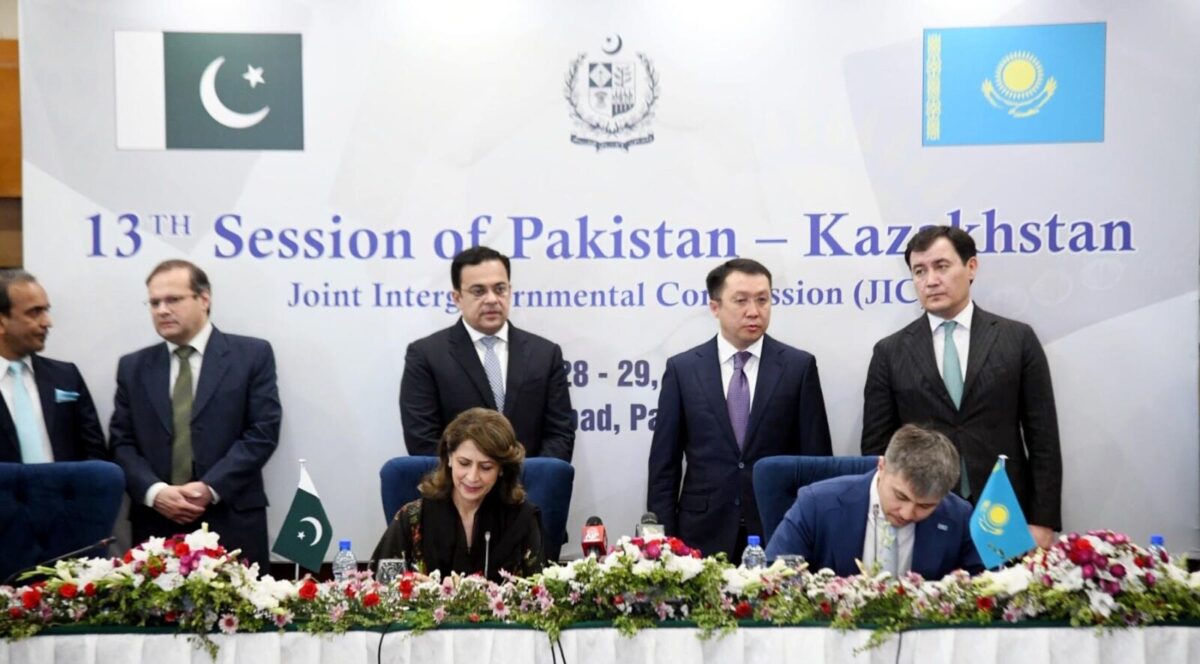Pakistan-Kazakhstan IGC concludes with the signing of important protocols and MoUs

Advertisement - ISLAMABAD, Apr 29 (APP): The 13th Session of the Pakistan-Kazakhstan Joint Intergovernmental Commission (IGC) on Trade, Economic, Scientific, Technical and Cultural Cooperation was concluded here on Tuesday. The session was co-chaired by Mr. Ahad Cheema, Federal Minister for Economic Affairs, and Mr. Marat Karabayev, Minister of Transport of the Republic of Kazakhstan. Both sides reviewed the progress made since the last meeting and agreed on a number of new initiatives to further strengthen bilateral cooperation. In this regard, protocols and MoUs were signed by both co-chairs, said a press release. Ahad Cheema, Minister for Economic Affairs, underscored the substantial progress made in bilateral relations between Pakistan and Kazakhstan during the 13th Session of the Joint Intergovernmental Commission. He highlighted the signing of key agreements, such as the Roadmap for Trade and Economic Cooperation and the Memorandum of Understanding on Electronic Trade, which will play a critical role in facilitating smoother trade flows and fostering broader economic collaboration. Cheema emphasized the importance of initiatives like the multimodal trade corridor and the formation of the Joint International Consortium of Logistics Companies, which will drive regional integration and enhance connectivity between the two countries. He expressed strong confidence that these efforts will contribute significantly to increasing bilateral trade and diversifying investments, setting the stage for a more interconnected and prosperous future. Moreover, Minister Cheema reaffirmed Pakistan’s commitment to strengthening cooperation with Kazakhstan across a range of sectors, including transport, investment, culture, tourism, and youth engagement. He noted that the session had created a solid foundation for future collaborations, emphasizing that Pakistan is ready to fully support Kazakhstan’s growing interests in regional connectivity and economic integration. Cheema also highlighted the importance of people-to-people ties, particularly through the shared cultural heritage and growing cooperation in sports and tourism. He concluded by expressing deep gratitude to Kazakhstan for its valuable partnership and reiterated the strong desire to continue building on the momentum established during this session, which promises a brighter and more prosperous future for both nations. In the light of above commitments, both sides agreed to accelerate the finalization of the Transit Trade Agreement and begin the practical implementation of the Roadmap for Trade and Economic Cooperation. The signing of the Memorandum of Understanding on Electronic Trade was also welcomed. Connectivity and transport were key areas of focus. Both sides reaffirmed the importance of regional trade corridors, particularly the Kazakhstan-Turkmenistan-Afghanistan-Pakistan and Kazakhstan-Uzbekistan-Afghanistan-Pakistan routes. It was agreed to promote their use under the International Motor Transport Agreement. The successful launch of a multimodal trade corridor from Jebel Ali (UAE) to Almaty, via Pakistan, was acknowledged as a milestone in regional integration. The parties agreed to enhance cooperation between logistics companies and develop joint ventures to facilitate cross-border movement of goods through ports in Karachi, Qasim, and Gwadar. In agriculture, both countries agreed to hold the first meeting of the Joint Working Group and share investment opportunities in the sector. Cooperation in plant protection and quarantine standards will also be enhanced. In the financial sector, progress was made towards signing an MoU between the State Bank of Pakistan and the Kazakhstan Agency for Regulation and Development of the Financial Market. Pakistan also offered capacity-building support through training programs for central and commercial banking professionals. Tourism and cultural exchange featured prominently in the discussions. Both sides agreed to promote tourism by sharing lists of certified tour operators and launching joint promotional activities. The Kazakh side expressed interest in opening branches of the Chess Academy and the “Qazaq Batyry” Mixed Martial Arts Academy in Islamabad. The parties also appreciated the signing of cultural cooperation agreements and agreed to name streets in Islamabad and Astana after Abai Qunanbaiuly and Muhammad Ali Jinnah, respectively. In the field of education, the two sides agreed to establish a Joint Working Group to strengthen academic collaboration and facilitate exchange programs for students and faculty. Discussions also included the possibility of setting up a Science and Technology Centre named after K. Satbayev at NUST, Islamabad. Progress was made on several agreements aimed at enhancing cooperation in higher education, technical training, and research. The information technology sector saw positive developments, with both countries agreeing to strengthen digital cooperation. MoUs were signed between NADRA and Kazakhstan’s National Information Technologies agency, as well as between Astana Hub and Ignite, laying the foundation for joint work in digital innovation and governance. In the energy sector, Pakistan offered Kazakhstan opportunities for investment and joint ventures in oil and gas exploration. It was agreed to convene the next meeting of the Joint Working Group on Energy later this year. Both sides expressed satisfaction over the outcomes of the session and reiterated their commitment to deepening bilateral cooperation. It was agreed that the 14th Session of the Commission will be held in Astana in 2026, with dates to be finalized through diplomatic channels.


















